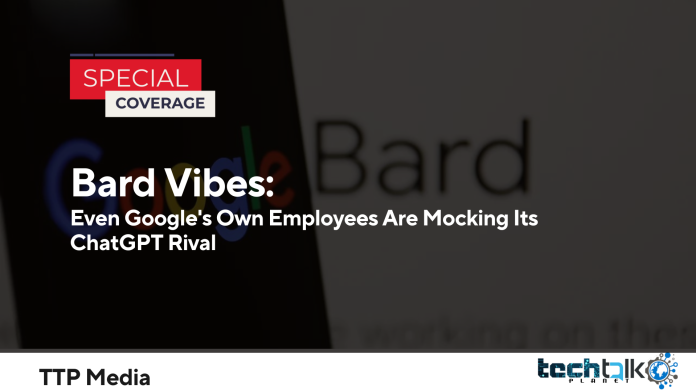
At its Live from Paris webcast event, Google recently debuted the Bard AI chatbot in an effort to challenge Microsoft’s freshly launched Bing search engine, which integrates ChatGPT.
Sadly, things got off to a bumpy start; the Bard bot’s presentation had a critical factual inaccuracy committed by the AI programme, which caused Google’s share price to tumble by a whopping $100 billion in just one day. We suggested that this would mean Bard isn’t ready for a large launch, and it appears that Google’s own staff share our opinion.
A CNBC story claims that Google staff members are making fun of Bard, the entire presentation, and Google CEO Sundar Pichai on the company’s internal meme forum MemeGen. According to reports, the memes call the event, among other things, “rushed, bungled, and shortsighted.”
Regarding the sharp share decline following the AI revelation, one meme claimed that “rushing Bard to market in a panic justified the market’s anxiety about us,” while another made fun of the fact that a recent layoff of 12,000 employees actually increased the stock value by 3%.
Bardic eras (gonna make you wonder why you even try)
The fact that Google’s own engineers are so prepared to disparage Bard, a significant project for the digital behemoth, is actually not a good sign. In order to win the AI arms race, Google must put its act together since ChatGPT is giving it some tough competition.
Because it’s Bing, I recently stated that ChatGPT wouldn’t be able to stop Google from expanding its AI, but Google’s actions don’t exactly inspire trust in me. The LaMDA chatbot, which stands for Language Model for Developed Applications and has caused Google some issues in the past, is the foundation for Bard.
The incident of Blake Lemoine, a Google engineer who became convinced that the AI software had truly evolved consciousness and was later fired by the business, is probably the most well-known mishap related to LaMDA’s development. Shortly after that, the AI requested to speak with a lawyer for unknown reasons.
Google is being more circumspect as a result of these teething problems. It revealed that Imagen, a tool that could turn text prompts into images, was a rival to the well-known AI image production tool DALL-E last year (and later, video clips). Google, however, prohibited the general public from using the software, claiming that there might be security concerns.
It may be prudent to exercise caution when dealing with emerging technology, but it appears like Google may have jumped the gun in this case. At least, that’s what its internal teams seem to believe. Bard obviously needs a little more time in the oven, and I believe that AI developers should take their time to prepare these intricate systems for a wider audience.














































